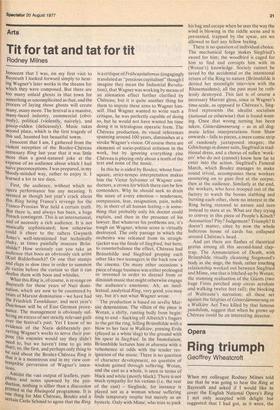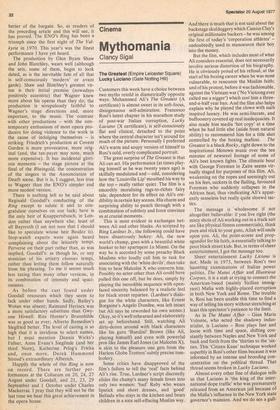Opera
Ring triumph
Geoffrey Wheatcroft
When my colleague Rodney Milnes told me that he was going to hear the Ring at Bayreuth and asked if I would like to cover the English National Opera's Ring I not only accepted with delight but suggested that I had got, as it were, the better of the bargain. So, as .readers of the preceding article and this will see, it has proved. The ENO's Rind has been a triumph since the first night of The Valkyrie in 1970. This year's was the finest performance I have yet heard. ,
The production by Glen Byam Shaw and John Blatchley, wears well (although the sets, some of them, begin to look dated, as is the inevitable fate of all that is self-consciously 'modern' or avant garde). Shaw and Blatchley's greatest vir tue is their initial premiss (nowadays positively eccentric) that Wagner knew more about his operas than they do; the production is scrupulously faithful to Wagner's stage directions and, more important, to the music. The contrast with other productions — with the con temporary enthusiasm of most opera producers for doing violence to the work in the cause of indulging themselves — is striking. Friedrich's production at Covent Garden is more provocative, more orig inal (and, the tax-payer may note, much more expensive). It has incidental glorious moments — the stage picture at the final of the Rhein gold, the concentration of the singers in the Annunciation of Death scene. But it is, I suggest, less true to Wagner than the ENO's simpler and more modest version.
There is nothing left to be said about Reginald Goodall's conducting of the Ring except to salute it and to con gratulate ourselves on our luck; here is the only heir of Knappertsbusch, in Lon don rather than anywhere else, least of all Bayreuth (I am not sure that I should like to speculate whose heir Boulez is).
Stoplvatch experts were again heard complaining about the leisurely tempi. Perverse on their part rather than, as was implied, Goodall's: as though he, or any musician of his artistry chooses tempi, rather than letting them follow naturally from his phrasing. To me it seems much less taxing than many other versions, in its combination of intensity and spaciousness.
As before the cast found under Goodall resources which they seem to lack under other hands. Sadly, Bailey's Wotan was absent; Raimund Herincx was a more satisfactory substitute than Gwynne Howell. Rita Hunter's Brunnhilde was as good as ever; Alberto Remedios's Siegfried better. The level of casting is so high that it is invidious to select names, but I must mention Dennis Wicks's Fafner, Anne Evans's Sieglinde (and her , third Norn), Katherine Pring's Fricka and, once more, Derek Hammond Stroud's extraordinary Alberich.
Happily the whole of this Ring is now on record. There are further performances at the Coliseum on 20, 24, 27 August under Goodall, and 21, 23, 29 September and 1 October under Charles Mackerras. I pray that they will not be the last time we hear this great achievement in the opera house.
































 Previous page
Previous page